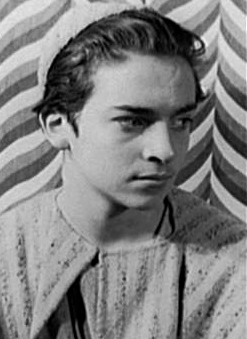Sidney Lumet facts for kids
Quick facts for kids
Sidney Lumet
|
|
|---|---|
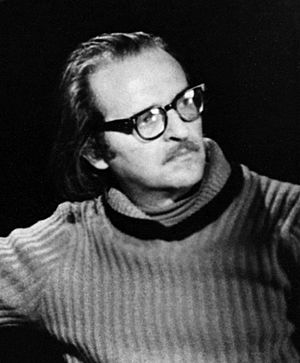
Lumet in 1970
|
|
| Born |
Sidney Arthur Lumet
June 25, 1924 Philadelphia, Pennsylvania, U.S.
|
| Died | April 9, 2011 (aged 86) New York City, U.S.
|
| Alma mater | Columbia University |
| Occupation |
|
| Years active | 1930–2007 |
| Spouse(s) |
Gail Jones
(m. 1963; div. 1978)Mary Gimbel
(m. 1980) |
| Children | 2, including Jenny Lumet |
| Parent(s) |
|
Sidney Arthur Lumet (June 25, 1924 – April 9, 2011) was a famous American film director. He was nominated five times for the Oscars. Four of these nominations were for Best Director for his movies 12 Angry Men (1957), Dog Day Afternoon (1975), Network (1976), and The Verdict (1982). He also received a nomination for Best Adapted Screenplay for Prince of the City (1981).
Even though he didn't win an individual Oscar, he received an Academy Honorary Award for his life's work. Many of his films were nominated for Oscars, showing how much his work was respected. People often called Lumet one of the most productive filmmakers of his time. He directed more than one movie a year on average after starting in 1957.
Experts noted his strong way of directing actors and his exciting storytelling. They also praised the "social realism" in his best movies, meaning his films showed real-life issues. Film critic Roger Ebert called him "one of the finest craftsmen and warmest humanitarians among all film directors." Lumet was also known as an "actor's director" because he worked so well with many great actors. Sean Connery, who was in five of Lumet's films, said Lumet was one of his favorite directors.
Lumet started his career directing plays in New York and then became a very good TV director. His first movie, 12 Angry Men (1957), was a courtroom drama about a jury deciding a case. After this, Lumet directed many different types of films. These included political and social dramas, movies based on plays and books, and realistic crime stories like Serpico and Prince of the City. He was one of the first directors to successfully move from TV to making movies.
In 2005, Lumet received an Oscar for his lifetime achievements in film. Two years later, he directed his last movie, Before the Devil Knows You're Dead (2007). After he passed away in 2011, a special event was held in New York to celebrate his work. In 2015, a documentary about his career, By Sidney Lumet, was released.
Contents
Biography
Early Life and Beginnings
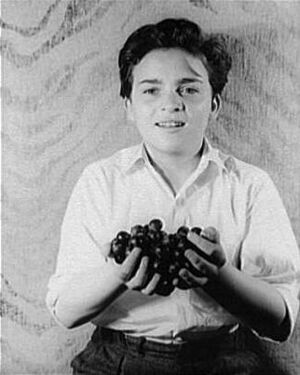
Sidney Lumet was born in Philadelphia. He grew up in the Lower East Side of Manhattan, New York City. He studied acting at the Professional Children's School and Columbia University.
His parents, Baruch and Eugenia Lumet, were actors in Yiddish theater. They had moved to the United States from Poland. His father was an actor, director, producer, and writer. Lumet's mother, who was a dancer, died when he was young.
Sidney started acting on the radio at age four. He made his stage debut at the Yiddish Art Theatre at age five. As a child, he also appeared in many Broadway plays. These included Dead End in 1935 and The Eternal Road.
In 1935, when he was 11, he was in a short film called Papirossen. This film was shown with a play of the same name. In 1939, at age 15, he appeared in his only full-length movie as an actor, ...One Third of a Nation....
His early acting career was paused by World War II. He spent four years in the U.S. Army. After serving in India and Burma from 1942 to 1946, he became involved with the Actors Studio. He then started his own theater group. He directed an Off-Broadway group and continued directing in summer theater. He also taught acting at the High School of Performing Arts.
Starting His Directing Career
Lumet began his career directing plays away from Broadway. Then, he became a well-known TV director. He started directing television in 1950. He quickly developed a fast way of shooting scenes. This was needed because TV shows had to be made very quickly.
He directed hundreds of episodes for shows like Danger, Mama, and You Are There. The show You Are There featured Walter Cronkite. Lumet chose Cronkite because he had a warm and trustworthy personality.
He also directed original plays for shows like Playhouse 90 and Kraft Television Theatre. He directed about 200 episodes in total. This made him one of the most productive and respected directors in the business. His ability to work fast helped him later in his film career. Many of these TV dramas were so good that they were later made into movies.
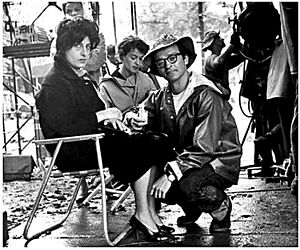
His first movie, 12 Angry Men (1957), was based on a live TV play. It was a great start for Lumet. Critics loved it, and it showed he was skilled at turning stories from other places into movies. Half of Lumet's films came from plays.
In 1960, a TV show he directed, The Sacco-Vanzetti Story, caused some discussion. This drama was about a famous court case. However, this discussion actually helped Lumet get more important film projects.
He started adapting classic plays for both film and TV. He directed Marlon Brando and Anna Magnani in the movie The Fugitive Kind (1959). This film was based on a play by Tennessee Williams. He later directed a live TV version of Eugene O'Neill's The Iceman Cometh. This was followed by his movie, A View from the Bridge (1962). This was another drama based on a play by Arthur Miller. Then came another Eugene O'Neill play turned into a movie, Long Day's Journey into Night (also 1962). Katharine Hepburn received an Oscar nomination for her role in this film.
Directing Style and Subjects
Realistic and Energetic Style
Film experts noted that Lumet was a very direct and energetic director. He learned his skills during the "golden age" of television in the 1950s. The words "Sidney Lumet" and "energy" became linked. This energy was present even in quiet moments of his films. It was a deep energy that Lumet saw in people and brought out in them. When he filmed in the streets of New York, he made them feel alive.
Working with Actors
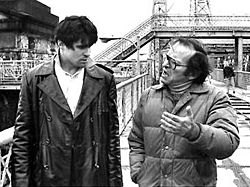
Lumet believed that making a film was a team effort. He was known for being open to ideas from writers, actors, and other artists. He was especially good at directing actors. Many actors from the theater loved working with him. He helped actors like Marlon Brando, Katharine Hepburn, Paul Newman, and Sean Connery give powerful performances. Film critic Mick LaSalle wrote, "Give him a good actor, and he just might find the great actor lurking within."
Sometimes, Lumet chose actors who were not very experienced. But he could still help them give amazing performances. He did this with Nick Nolte, Jane Fonda, and Faye Dunaway. Jane Fonda said, "he was a master. Such control of his craft."
Lumet believed that movies are an art form. He thought that good movies get a lot of attention. Because he started as an actor, he understood acting from an actor's point of view. This made him known as an "actor's director."
Historians say Lumet's understanding of actors and city life made him a leader in the "Neorealist" style. This style focuses on real life and moral responsibility. His early film The Hill (1965) was seen as a very strong political film. His films often showed that love and reason would win in the end. They also showed that justice would eventually be served, or not. His first film, Twelve Angry Men, was praised for showing liberal thinking and teamwork.
Lumet's films often featured actors who used "Method acting". This style focuses on showing deep, real emotions. An example is Al Pacino, who studied Method acting. Lumet also liked his actors and settings to feel natural and unplanned. He often filmed on location to give his movies a realistic look.
Rehearsal and Preparation
Lumet strongly believed in rehearsing. He felt that if actors rehearsed well, they wouldn't lose their naturalness. He thought rehearsals helped actors understand their whole role. Director Peter Bogdanovich asked him about rehearsals. Lumet said he liked to rehearse for at least two weeks before filming.
Faye Dunaway, who starred in Network (1976), said that during these weeks, Lumet also planned the scenes with his cameraman. Because of this, she added, "not a minute is wasted while he's shooting." This saved money and helped the actors perform better.
Because his actors were well-rehearsed, he could film very quickly. This helped him stay within his budget. For example, when filming Prince of the City (1981), there were over 130 speaking roles and 135 different locations. Yet, he finished filming in just 52 days. Actors wanted to work with him because they saw him as an "outstanding director of actors."
Lumet was very good at rehearsals and helping actors build their characters. He could give his performers a chance to show their skills. He also helped them make their acting deeper. Actor Christopher Reeve said Lumet knew how to talk about acting in many ways. He could discuss "Method" acting and improvisation equally well.
Joanna Rapf wrote about the filming of The Verdict (1982). She said Lumet paid a lot of personal attention to his actors. She described how Lumet and star Paul Newman sat on a bench to discuss an important scene. Actors would walk through their scenes before the camera rolled. This preparation was done because Lumet liked to shoot a scene in one or two takes. Newman called him "Speedy Gonzales." Newman said Lumet didn't film more than he needed to.
Film critic Betsey Sharkey agreed. She said Lumet was a master of using one or two takes. She remembered Faye Dunaway saying Lumet worked so fast it was like he was on roller skates.
Developing Characters
Biographer Joanna Rapf noted that Lumet was an independent director. He liked to make films about "men who summon courage to challenge the system." This also included female characters, like in Garbo Talks (1984). The star, Anne Bancroft, played a character Lumet liked. She was an activist who stood up for others. She was lively, brave, and refused to follow the crowd.
In a 2006 interview, Lumet said he was interested in the human cost of following one's passions. He also explored how these passions affect others. This idea is central to most of his movies. Examples include his true-life films about corruption in the New York City Police Department or family dramas like Daniel (1983).
Psychological Dramas
Film historian Stephen Bowles believed Lumet was best at directing serious psychological dramas. His Oscar nominations were all for films about men facing big problems. From his first film, Twelve Angry Men, to The Verdict, Lumet was great at putting drama on screen. Most of his characters were driven by strong feelings or goals. These included seeking justice, honesty, or truth, or dealing with jealousy, memory, or guilt. Lumet was fascinated by these intense human conditions.
Lumet's main characters were often "antiheroes." These were ordinary men who rebelled against a group or system. For Lumet, the most important thing was not whether actions were right or wrong. It was whether they were real and came from the person's own beliefs. For example, Frank Serpico, a whistleblower, was a typical Lumet hero. Lumet called him a "rebel with a cause."
An earlier example of his psychological dramas was The Pawnbroker (1964). It starred Rod Steiger. Steiger played a Holocaust survivor whose spirit was broken. He lived as a pawn shop manager in Harlem. Lumet used flashbacks to show the character's deep psychological scars. Steiger said this film was his favorite role.
Focus on Social Justice
Serpico (1973) was one of four important films Lumet made in the 1970s. It showed him as one of the greatest filmmakers of his time. Serpico told the story of power and betrayal in the New York City police force. It featured an idealistic policeman fighting against huge challenges.
Lumet grew up poor in New York City during the Great Depression. He saw poverty and corruption around him. This taught him early on how important justice is for a democracy. He tried to show this in his films.
New York City as a Setting
Lumet always preferred to work in New York City. He avoided the main film industry in Hollywood. As a director, he became strongly linked to New York City. He said he always liked being in "Woody Allen's world." He felt that the city's variety, its many neighborhoods, its art, and its crime all inspired him. He believed that to create, one must face reality every day. For Lumet, "New York is filled with reality; Hollywood is a fantasyland."
He used New York City many times as the background for his films. It often symbolized his concern with America's problems. Lumet was drawn to crime stories set in New York City. In these stories, criminals get caught in events they cannot control but must solve.
Exploring Themes of Guilt and Family
Lumet's films often explored themes of guilt and family. This sometimes reflected his Jewish background and the diverse culture of New York City. For example, his film A Stranger Among Us (1992) is about a female police officer. She goes undercover in a Hasidic community in New York City.
The idea of "guilt" appears in many of Lumet's films. From his first movie, 12 Angry Men (1957), where a jury decides a young man's guilt, to Q&A (1990), where a lawyer looks into a policeman's guilt, it's a common theme. In a film like Murder on the Orient Express (1974), all the suspects are guilty.
His films also focused strongly on family life. They often showed tensions within families. This focus included "surrogate families," like in his police films Serpico (1973), Prince of the City (1981), and Q & A. An "untraditional family" is also shown in Dog Day Afternoon (1975).
Directing Techniques and Vision
Lumet always preferred a natural or realistic style. He didn't like cameras to draw attention to themselves. He edited his films so the camera felt invisible. His cameraman Ron Fortunato said Lumet didn't like anything that looked "too artsy."
Because he was willing to tackle important social issues, he got strong performances from his main actors. He also got great work from supporting actors. He is seen as a key figure in New York filmmaking. He stuck to good scripts when he found them. Although critics had different opinions of his films, Lumet's work is generally highly regarded. Most critics described him as a sensitive and smart director. They said he had good taste, was brave enough to try new styles, and was "gifted at handling actors."
Critic Justin Chang added that Lumet's skill as a director continued until his last film in 2007. He wrote about Lumet's "nimble touch with performers." He could bring out warmth and humor, but also guide them to show darker, more emotional sides. This was clear in his last film, Before the Devil Knows You're Dead.
In an interview, Lumet said he expected to see more directors from different backgrounds. He hoped they would tell their own stories. He said, "You know, I started out making films about Jews and Italians and Irish because I didn't know anything else."
Filmography
| Year | Film | Distributor |
|---|---|---|
| 1957 | 12 Angry Men | United Artists |
| 1958 | Stage Struck | RKO Pictures |
| 1959 | That Kind of Woman | Paramount Pictures |
| 1960 | The Fugitive Kind | United Artists |
| 1962 | A View from the Bridge | Continental Film |
| Long Day's Journey into Night | Embassy Pictures | |
| 1964 | The Pawnbroker | Paramount Pictures |
| Fail Safe | Columbia Pictures | |
| 1965 | The Hill | Metro-Goldwyn-Mayer |
| 1966 | The Group | United Artists |
| 1967 | The Deadly Affair | Columbia Pictures |
| 1968 | Bye Bye Braverman | Warner Bros. |
| The Sea Gull | ||
| 1969 | The Appointment | Metro-Goldwyn-Mayer |
| 1970 | Last of the Mobile Hot Shots | Warner Bros. |
| 1971 | The Anderson Tapes | Columbia Pictures |
| 1972 | Child's Play | Paramount Pictures |
| 1973 | The Offence | United Artists |
| Serpico | Paramount Pictures | |
| 1974 | Lovin' Molly | Columbia Pictures |
| Murder on the Orient Express | Paramount Pictures | |
| 1975 | Dog Day Afternoon | Warner Bros. |
| 1976 | Network | Metro-Goldwyn-Mayer |
| 1977 | Equus | United Artists |
| 1978 | The Wiz | Universal Pictures |
| 1980 | Just Tell Me What You Want | Warner Bros. |
| 1981 | Prince of the City | |
| 1982 | Deathtrap | |
| The Verdict | 20th Century Fox | |
| 1983 | Daniel | Paramount Pictures |
| 1984 | Garbo Talks | Metro-Goldwyn-Mayer |
| 1986 | Power | 20th Century Fox |
| The Morning After | ||
| 1988 | Running on Empty | Warner Bros. |
| 1989 | Family Business | Tri-Star Pictures |
| 1990 | Q&A | |
| 1992 | A Stranger Among Us | Buena Vista Pictures |
| 1993 | Guilty as Sin | |
| 1996 | Night Falls on Manhattan | Paramount Pictures |
| 1997 | Critical Care | LIVE Entertainment |
| 1999 | Gloria | Columbia Pictures |
| 2006 | Find Me Guilty | Freestyle Releasing |
| 2007 | Before the Devil Knows You're Dead | ThinkFilm |
Awards and Recognition
Sidney Lumet was recognized by the Academy of Motion Picture Arts and Sciences for these films:
- 30th Academy Awards (1957): Nominated for Best Director, 12 Angry Men
- 48th Academy Awards (1975): Nominated for Best Director, Dog Day Afternoon
- 49th Academy Awards (1976): Nominated for Best Director, Network
- 55th Academy Awards (1981): Nominated for Best Adapted Screenplay, Prince of the City
- 56th Academy Awards (1982): Nominated for Best Director, The Verdict
- 77th Academy Awards (2004): Won an Honorary Academy Award
Lumet also received the Berlin International Film Festival's Golden Bear for 12 Angry Men. He was nominated four times for the Cannes Film Festival Palme d'Or. These nominations were for Long Day's Journey into Night (1962), The Hill (1965), The Appointment (1969), and A Stranger Among Us (1992). He was also nominated for a Venice Film Festival Golden Lion award for Prince of the City (1981).
He did not win an individual Oscar during his career, but he did receive an Academy Honorary Award in 2005. This award was for his "brilliant services to screenwriters, performers, and the art of the motion picture." Fourteen of his films were nominated for various Oscars. For example, Network was nominated for 10 Oscars and won 4.
After Lumet's death in April 2011, a special event was held at New York's Lincoln Center. Many speakers and film stars attended to celebrate his work. In October 2011, the organization Human Rights First started the "Sidney Lumet Award for Integrity in Entertainment."
| Year | Title | Academy Awards | BAFTA Awards | Golden Globe Awards | |||
|---|---|---|---|---|---|---|---|
| Nominations | Wins | Nominations | Wins | Nominations | Wins | ||
| 1957 | 12 Angry Men | 3 | 2 | 1 | 4 | ||
| 1962 | Long Day's Journey into Night | 1 | 1 | ||||
| 1964 | The Pawnbroker | 1 | 2 | 1 | 1 | ||
| Fail Safe | 1 | ||||||
| 1965 | The Hill | 6 | 1 | ||||
| 1966 | The Group | 1 | 1 | ||||
| 1967 | The Deadly Affair | 5 | |||||
| 1970 | King: A Filmed Record... Montgomery to Memphis | 1 | |||||
| 1973 | The Offence | 1 | |||||
| Serpico | 2 | 3 | 2 | 1 | |||
| 1974 | Murder on the Orient Express | 6 | 1 | 10 | 3 | ||
| 1975 | Dog Day Afternoon | 6 | 1 | 6 | 2 | 7 | |
| 1976 | Network | 10 | 4 | 9 | 1 | 5 | 4 |
| 1977 | Equus | 3 | 5 | 1 | 2 | 2 | |
| 1978 | The Wiz | 4 | 5 | 1 | 2 | 2 | |
| 1981 | Prince of the City | 1 | 3 | ||||
| 1982 | The Verdict | 5 | 5 | ||||
| 1984 | Garbo Talks | 1 | |||||
| 1986 | The Morning After | 1 | 3 | ||||
| 1988 | Running on Empty | 2 | 5 | 1 | |||
| 1990 | Q&A | 1 | |||||
| Total | 46 | 6 | 56 | 11 | 43 | 10 | |
Personal Life and Death
Sidney Lumet was married four times. His first three marriages ended in divorce. He was married to actress Rita Gam from 1949 to 1955. Then, he was married to artist and heiress Gloria Vanderbilt from 1956 to 1963. His third marriage was to Gail Jones from 1963 to 1978. Finally, he married Mary Bailey Gimbel in 1980, and they stayed married until his death.
He had two daughters with Gail Jones: Amy and Jenny. Jenny is an actress and screenwriter. She had a main role in his film Q&A. She also wrote the screenplay for the movie Rachel Getting Married (2008).
Sidney Lumet passed away at age 86 on April 9, 2011. He died at his home in Manhattan from lymphoma, a type of cancer.
See also
 In Spanish: Sidney Lumet para niños
In Spanish: Sidney Lumet para niños
 | Frances Mary Albrier |
 | Whitney Young |
 | Muhammad Ali |


